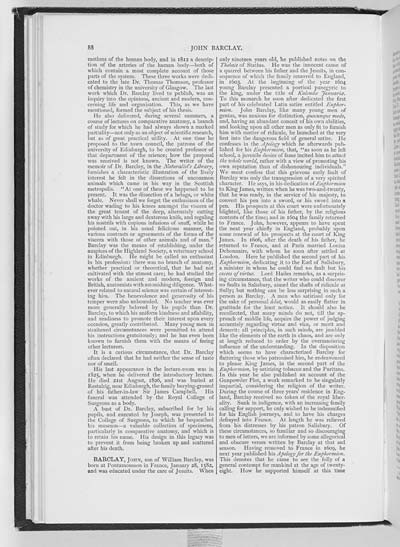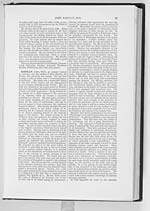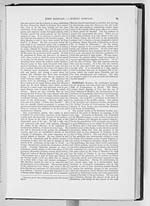88
motions of the human body, and in 1812 a descrip-
tion of the arteries of the human body�both of
which contain a most complete account of those
parts of the system. These three works were dedi-
cated to the late Dr. Thomas Thomson, professor
of chemistry in the university of Glasgow. The last
work which Dr. Barclay lived to publish, was an
inquiry into the opinions, ancient and modern, con-
cerning life and organization. This, as we have
mentioned, formed the subject of his thesis.
He also delivered, during several summers, a
course of lectures on comparative anatomy, a branch
of study for which he had always shown a marked
partiality�not only as an object of scientific research,
but as of great practical utility. At one time he
proposed to the town council, the patrons of the
university of Edinburgh, to be created professor of
that department of the science; how the proposal
was received is not known. The writer of the
memoir of Dr. Barclay, in the Naturalist's Library,
furnishes a characteristic illustration of the lively
interest he felt in the dissections of uncommon
animals which came in his way in the Scottish
metropolis. "At one of these we happened to be
present. It was the dissection of a beluga, or white
whale. Never shall we forget the enthusiasm of the
doctor wading to his knees amongst the viscera of
the great tenant of the deep, alternately cutting
away with his large and dexterous knife, and regaling
his nostrils with copious infusions of snuff, while he
pointed out, in his usual felicitous manner, the
various contrasts or agreements of the forms of the
viscera with those of other animals and of man."
Barclay was the means of establishing, under the
auspices of the Highland Society, a veterinary school
in Edinburgh. He might be called an enthusiast
in his profession: there was no branch of anatomy,
whether practical or theoretical, that he had not
cultivated with the utmost care; he had studied the
works of the ancient and modern, foreign and
British, anatomists with astonishing diligence. What-
ever related to natural science was certain of interest-
ing him. The benevolence and generosity of his
temper were also unbounded. No teacher was ever
more generally beloved by his pupils than Dr.
Barclay, to which his uniform kindness and affability,
and readiness to promote their interest upon every
occasion, greatly contributed. Many young men in
straitened circumstances were permitted to attend
his instructions gratuitously; and he has even been
known to furnish them with the means of feeing
other lecturers.
It is a curious circumstance, that Dr. Barclay
often declared that he had neither the sense of taste
nor of smell.
His last appearance in the lecture-room was in
1825, when he delivered the introductory lecture.
He died 21st August, 1826, and was buried at
Restalrig, near Edinburgh, the family burying-ground
of his father-in-law Sir James Campbell. His
funeral was attended by the Royal College of
Surgeons as a body.
A bust of Dr. Barclay, subscribed for by his
pupils, and executed by Joseph, was presented to
the College of Surgeons, to which he bequeathed
his museum�a valuable collection of specimens,
particularly in comparative anatomy, and which is
to retain his name. His design in this legacy was
to prevent it from being broken up and scattered
after his death.
BARCLAY, JOHN, son of William Barclay, was
born at Pontamousson in France, January 28, 1582,
and was educated under the care of Jesuits. When
only nineteen years old, he published notes on the
Thebais of Statius. He was the innocent cause of
a quarrel between his father and the Jesuits, in con-
sequence of which the family removed to England,
in 1603. At the beginning of the year 1604
young Barclay presented a poetical panegyric to
the king, under the title of Kalend� Januari�.
To this monarch he soon after dedicated the first
part of his celebrated Latin satire entitled Euphor-
mion. John Barclay, like many young men of
genius, was anxious for distinction, quocunque modo,
and, having an abundant conceit of his own abilities,
and looking upon all other men as only fit to furnish
him with matter of ridicule, he launched at the very
first into the dangerous field of general satire. He
confesses in the Apology which he afterwards pub-
lished for his Euphormion, that, "as soon as he left
school, a juvenile desire of fame incited him to attack
the whole world, rather with a view of promoting his
own reputation than of dishonouring individuals."
We must confess that this grievous early fault of
Barclay was only the transgression of a very spirited
character. He says, in his dedication of Euphormion
to King James, written when he was two-and-twenty,
that he was ready, in the service of his majesty, to
convert his pen into a sword, or his sword into a
pen. His prospects at this court were unfortunately
blighted, like those of his father, by the religious
contests of the time; and in 1604 the family returned
to France. John, however, appears to have spent
the next year chiefly in England, probably upon
some renewal of his prospects at the court of King
James. In 1606, after the death of his father, he
returned to France, and at Paris married Louisa
Debonnaire, with whom he soon after settled at
London. Here he published the second part of his
Euphormion, dedicating it to the Earl of Salisbury,
a minister in whom he could find no fault but his
excess of virtue. Lord Hailes remarks, as a surpris-
ing circumstance, that the writer who could discover
no faults in Salisbury, aimed the shafts of ridicule at
Sully; but nothing can be less surprising in such a
person as Barclay. A man who satirized only for
the sake of personal �clat, would as easily flatter in
gratitude for the least notice. It should also be
recollected, that many minds do not, till the ap-
proach of middle life, acquire the power of judging
accurately regarding virtue and vice, or merit and
demerit: all principles, in such minds, are jumbled
like the elements of the earth in chaos, and are only
at length reduced to order by the overmastering
influence of the understanding. In the disposition
which seems to have characterized Barclay for
flattering those who patronised him, he endeavoured
to please King James, in the second part of the
Euphormion, by satirizing tobacco and the Puritans.
In this year he also published an account of the
Gunpowder Plot, a work remarked to be singularly
impartial, considering the religion of the writer.
During the course of three years' residence in Eng-
land, Barclay received no token of the royal liber-
ality. Sunk in indigence, with an increasing family
calling for support, he only wished to be indemnified
for his English journeys, and to have his charges
defrayed into France. At length he was relieved
from his distresses by his patron Salisbury. Of
these circumstances, so familiar and so discouraging
to men of letters, we are informed by some allegorical
and obscure verses written by Barclay at that sad
season. Having removed to France in 1609, he
next year published his Apology for the Euphormion.
This denotes that he came to see the folly of a
general contempt for mankind at the age of twenty-
eight. How he supported himself at this time

![]() Universal Viewer |
Universal Viewer | ![]() Mirador |
Large image | Transcription
Mirador |
Large image | Transcription
![]()

